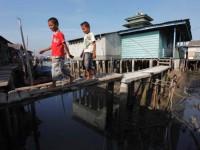Topics: Urban Water Management
Location: Manila, Philippines
Participants: Water utilities, community organizations, and local governments
Project: In a model first applied in the Philippines and later successfully adapted to Indonesia’s slums, Community Master Meters have increased access to water by the urban poor at an affordable price.
Due in part to regulations that keep tariffs low, public water companies often lack the funds to invest in service expansion. To address these issues, water utilities can partner with local governments and NGOs or CBOs to establish Community Master Meters. For example, in Indonesia, the water utility funds connections from the main network to a unit in each community. The local government, often with donor funding, will then build a simple network from the community unit to each household, using a simple above ground pipe network to facilitate monitoring and control illegal tapping. The utility provides water at a lower “bulk” price, and agrees with the CBOs on how much households will be charged. The CBOs in each community manage and maintain the unit, collect household fees, and pay the monthly bills.
The model varies from community to community. In Medan, Indonesia, a local NGO was responsible for organizing a number of CBOs that managed each community’s meter. In Manila, Philippines, a private engineering firm acted as the intermediary that hired local people to monitor and collect the subsidized fees from households. In all cases, the model benefits both the urban poor, whose access costs are reduced, and the utility, which increases its customer base and has to deal with a small group of NGOs rather than a large number of poor households.
Transferability: The case study was given to AUWSA – the water authority in Tanzania’s rapidly growing second city, Arusha – which has cited major challenges in getting existing customers to pay for services and in getting new households to enroll. This example was chosen because it is a model for expanding revenues so as to maintain, extend and improve water services.
Sources: WaterLinks. “Partnership Catalyzes Expansion of Water Services to Indonesia’s Urban Poor.” WaterNote 2009. Available online at: www.waterlinks.org/sites/default/files/Medan%20Pro-Poor%20WaterNote_0.pdf
Water Master Meters

